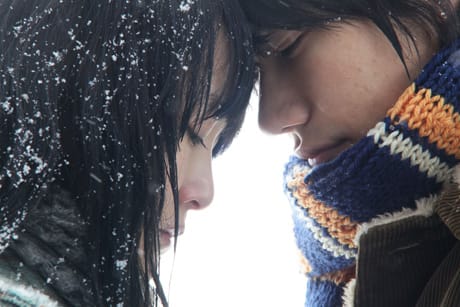The concern in adapting Haruki Murakami's widely read novel is that it's a deeply introspective read, speculating mostly on what characters think and feel but never say. Ostensibly, it's a tale of deeply unhappy people seeking some form of solace but not knowing how to do so. The fear is that it would resort to endless amounts of voiceover or expository character conversations that would betray the text.
And while there is indeed voiceover in Anh Hung Tran's adaptation, it's used primarily to contextualize a moment or offer a ghostly look into the future for a secondary character like Hatsumi, whose long-suffering relationship with constant philanderer Nagasawa (Tetsuji Tamayama) is eventually her undoing.
Told through the eyes of Watanabe (Ken'iche Matsuyama), as he recounts his college romance with Naoko (Rinko Kikuchi) after the suicide of Kizuki, her boyfriend and his best friend, this adaptation is deeply emotional, using flowing camerawork and the stillness of character interaction to reveal the underlying pain of these existentially distraught young adults.
With its defeatist template of unrequited love and self-destructive behaviour, Norwegian Wood handles Watanabe's affections and Naoko's equivocal actions with subtlety and grace. We understand why Naoko reaches out to her dead lover's best friend and why her psychological condition deteriorates, even as Watanabe struggles with idealistic notions of romance.
Similarly, as college classmate Midori (Kiko Mizuhara) reaches out to our protagonist, offering him romantic analogies and speaking of a mysterious other man, we see in her eyes the simultaneous desire to unload her feelings, along with her fear of being hurt. These moments are often handled by lingering on characters after the central conversation has ended, using a non-traditional, haunting soundtrack and breathtaking cinematography to link nature and environment to tone, creating mood and understanding without saying it to the camera.
Landscape shots of lush, green mountains and snow-covered valleys reflect both the vibrancy and defeat in the eyes of our confused young lovers. The traditional idea of growing up is equated with the absence of passion and desire, making this protracted recollection a powerfully sagacious look at the possibility of an exciting, mysterious future long gone.
Defeated and bruised from the realities of growing up, this is a deeply affecting tale of adult responsibility and the heightened emotions of youth.
(Asmik Ace)And while there is indeed voiceover in Anh Hung Tran's adaptation, it's used primarily to contextualize a moment or offer a ghostly look into the future for a secondary character like Hatsumi, whose long-suffering relationship with constant philanderer Nagasawa (Tetsuji Tamayama) is eventually her undoing.
Told through the eyes of Watanabe (Ken'iche Matsuyama), as he recounts his college romance with Naoko (Rinko Kikuchi) after the suicide of Kizuki, her boyfriend and his best friend, this adaptation is deeply emotional, using flowing camerawork and the stillness of character interaction to reveal the underlying pain of these existentially distraught young adults.
With its defeatist template of unrequited love and self-destructive behaviour, Norwegian Wood handles Watanabe's affections and Naoko's equivocal actions with subtlety and grace. We understand why Naoko reaches out to her dead lover's best friend and why her psychological condition deteriorates, even as Watanabe struggles with idealistic notions of romance.
Similarly, as college classmate Midori (Kiko Mizuhara) reaches out to our protagonist, offering him romantic analogies and speaking of a mysterious other man, we see in her eyes the simultaneous desire to unload her feelings, along with her fear of being hurt. These moments are often handled by lingering on characters after the central conversation has ended, using a non-traditional, haunting soundtrack and breathtaking cinematography to link nature and environment to tone, creating mood and understanding without saying it to the camera.
Landscape shots of lush, green mountains and snow-covered valleys reflect both the vibrancy and defeat in the eyes of our confused young lovers. The traditional idea of growing up is equated with the absence of passion and desire, making this protracted recollection a powerfully sagacious look at the possibility of an exciting, mysterious future long gone.
Defeated and bruised from the realities of growing up, this is a deeply affecting tale of adult responsibility and the heightened emotions of youth.
